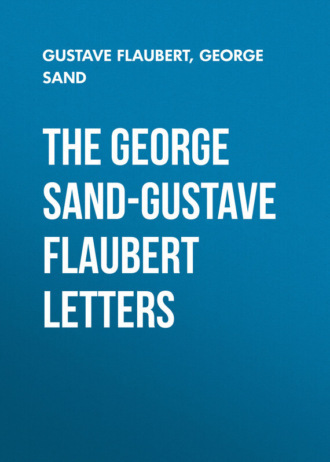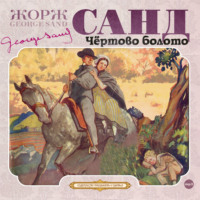 полная версия
полная версияThe George Sand-Gustave Flaubert Letters
Paris, to worrying about it no longer, and almost to thinking that it exists no longer.
As for me, I am not like the bourgeois; I consider that after the invasion there are no more misfortunes. The war with Prussia gave me the effect of a great upheaval of nature, one of those cataclysms that happen every six thousand years; while the insurrection in Paris is, to my eyes, a very clear and almost simple thing.
What retrogressions! What savages! How they resemble the people of the League and the men in armor! Poor France, who will never free herself from the Middle Ages! who labors along in the Gothic idea of the Commune, which is nothing else than the Roman municipality. Oh! I assure you that my heart is heavy over it!
And the little reaction that we are going to have after that? How the good ecclesiastics are going to flourish again!
I have started at Saint-Antoine once more, and I am working tremendously.
CLXXXVII. TO GUSTAVE FLAUBERT, at Croisset.
Nohant, 28 April, 1871
No, certainly I do not forget you! I am sad, sad, that is to say, that I am stunned, that I watch the spring, that I am busy, that I talk as if there were nothing; but I have not been able to be alone an instant since that horrible occurrence without falling into a bitter despair. I make great efforts to prevent it; I do not want to be discouraged; I do not want to deny the past and dread the future; but it is my will, it is my reason that struggles against a profound impression unsurmountable up to the present moment.
That is why I did not want to write to you before feeling better, not that I am ashamed to have crises of depression, but because I did not want to increase your sadness already so profound, by adding the weight of mine to it. For me, the ignoble experiment that Paris is attempting or is undergoing, proves nothing against the laws of the eternal progression of men and things, and, if I have gained any principles in my mind, good or bad, they are neither shattered nor changed by it. For a long time I have accepted patience as one accepts the sort of weather there is, the length of winter, old age, lack of success in all its forms. But I think that partisans (sincere) ought to change their formulas or find out perhaps the emptiness of every a priori formula.
It is not that which makes me sad. When a tree is dead, one should plant two others. My unhappiness comes from pure weakness of heart that I don't know how to overcome. I cannot sleep over the suffering and even over the ignominy of others. I pity those who do the evil! while I recognize that they are not at all interesting, their moral state distresses me. One pities a little bird that has fallen from its nest; why not pity a heap of consciences fallen in the mud? One suffered less during the Prussian siege. One loved Paris unhappy in spite of itself, one pities it so much the more now that one can no longer love it. Those who never loved get satisfaction by mortally hating it. What shall we answer? Perhaps we should not answer at all. The scorn of France is perhaps the necessary punishment of the remarkable cowardice with which the Parisians have submitted to the riot and its adventurers. It is a consequence of the acceptance of the adventurers of the Empire; other felons but the same cowardice.
But I did not want to talk to you of that, you ROAR about it enough as it is! one ought to be distracted; for if one thinks too much about it, one becomes separated from one's own limbs and lets oneself undergo amputation with too much stoicism.
You don't tell me in what state you found your charming nest at Croisset. The Prussians occupied it; did they ruin it, dirty it, rob it? Your books, your bibelots, did you find them all? Did they respect your name, your workshop? If you can work again there, peace will come to your spirit. As for me, I am waiting till mine gets well, and I know that I shall have to help myself to my own cure by a certain faith often shaken, but of which I make a duty.
Tell me whether the tulip tree froze this winter, and if the poppies are pretty.
I often take the journey in spirit; I see again your garden and its surroundings. How far away that is! How many things have happened since! One hardly knows whether one is a hundred years old or not!
My little girls bring me back to the notion of time; they are growing, they are amusing and affectionate; it is through them and the two beings who gave them to me that I feel myself still of the world; it is through you too, dear friend, whose kind and loving heart I always feel to be good and alive. How I should like to see you! But I have no longer a way of going and coming.
We embrace you, all of us, and we love you.
G. Sand
CLXXXVIII. TO GEORGE SAND
I am answering at once your questions that concern me personally. No! the Prussians did not loot my house. They HOOKED some little things of no importance, a dressing case, a bandbox, some pipes; but on the whole they did no harm. As for my study, it was respected. I had buried a large box full of letters and hidden my voluminous notes on Saint-Antoine. I found all that intact.
The worst of the invasion for me is that it has aged my poor, dear, old mother by ten years! What a change! She can no longer walk alone, and is distressingly weak! How sad it is to see those whom one loves deteriorate little by little!
In order to think no longer on the public miseries or on my own, I have plunged again with fury into Saint-Antoine, and if nothing disturbs me and I continue at this pace, I shall have finished it next winter. I am very eager to read to you the sixty pages which are done. When we can circulate about again on the railroad, do come to see me for a little while. Your old troubadour has waited for you for such a long time! Your letter of this morning has saddened me. What a proud fellow you are and what immense courage you have!
I am not like a lot of people whom I hear bemoaning the war of Paris. For my part, I find it more tolerable than the invasion, there is no more despair possible, and that is what proves once more our abasement. "Ah! God be thanked, the Prussians are there!" is the universal cry of the bourgeois. I put messieurs the workmen into the same pack, and would have them all thrust together into the river! Moreover they are on the way there, and then calm will return. We are going to become a great, flat industrial country like Belgium. The disappearance of Paris (as center of the government) will render France colorless and dull. She will no longer have a heart, a center, nor, I think, a spirit.
As for the Commune, which is about to die out, it is the last manifestation of the Middle Ages. The very last, let us hope!
I hate democracy (at least the kind that is understood in France), that is to say, the exaltation of mercy to the detriment of justice, the negation of right, in a word, antisociability.
The Commune rehabilitates murderers, quite as Jesus pardoned thieves, and they pillage the residences of the rich, because they have been taught to curse Lazarus, who was not a bad rich man, but simply a rich man. "The Republic is above every criticism" is equivalent to that belief: "The pope is infallible!" Always formulas! Always gods!
The god before the last, which was universal suffrage, has just shown his adherents a terrible farce by nominating "the murderers of Versailles." What shall we believe in, then? In nothing! That is the beginning of wisdom. It was time to have done with "principles" and to take up science, and investigation. The only reasonable thing (I always come back to that) is a government by mandarins, provided the mandarins know something and even that they know many things. The people is an eternal infant, and it will be (in the hierarchy of social elements) always in the last row, since it is number, mass, the unlimited. It is of little matter whether many peasants know how to read and listen no longer to their cure, but it is of great matter that many men like Renan or Littre should be able to live and be listened to! Our safety is now only in a LEGITIMATE ARISTOCRACY, I mean by that, a majority that is composed of more than mere numbers.
If they had been more enlightened, if there had been in Paris more people acquainted with history, we should not have had to endure Gambetta, nor Prussia, nor the Commune. What did the Catholics do to meet a great danger? They crossed themselves while consigning themselves to God and to the saints. We, however, who are advanced, we are going to cry out, "Long live the Republic!" while recalling what happened in '92; and there was no doubt of its success, observe that. The Prussian existed no longer, they embraced one another with joy and restrained themselves from running to the defiles of the Argonne where there are defiles no longer; never mind, that is according to tradition. I have a friend in Rouen who proposed to a club the manufacture of lances to fight against the breech-loaders!
Ah! it would have been more practical to keep Badinguet, in order to send him to the galleys once peace was made! Austria did not have a revolution after Sadowa, nor Italy after Novara, nor Russia after Sebastopol! But the good French hasten to demolish their house as soon as the chimney has caught fire.
Well, I must tell you an atrocious idea; I am AFRAID that the
destruction of the Vendome column is sowing the seeds of a third
Empire! Who knows if in twenty or in forty years, a grandson of
Jerome will not be our master?
For the moment Paris is completely epileptic. A result of the congestion caused by the siege. France, on the whole, has lived for several years in an extraordinary mental state. The success of la Lanterne and Troppman have been very evident symptoms of it. That folly is the result of too great imbecility, and that imbecility comes from too much bluffing, for because of lying they had become idiotic. They had lost all notion of right and wrong, of beautiful and ugly. Recall the criticism of recent years. What difference did it make between the sublime and the ridiculous? What lack of respect; what ignorance! what a mess! "Boiled or roasted, same thing!" and at the same time, what servility for the opinion of the day, the dish of the fashion!
All was false! False realism, false army, false credit, and even false harlots. They were called "marquises," while the great ladies called themselves familiarly "cochonnettes." Those girls who were of the tradition of Sophie Arnould, like Lagier, roused horror. You have not seen the reverence of Saint-Victor for la Paiva. And this falseness (which is perhaps a consequence of romanticism, predominance of passion over form, and of inspiration over rule) was applied especially in the manner of judging. They extolled an actress not as an actress, but as a good mother of a family! They asked art to be moral, philosophy to be clear, vice to be decent, and science to be within the range of the people.
But this is a very long letter. When I start abusing my contemporaries, I never get through with it.
CLXXXIX. TO GEORGE SAND
Croisset, Sunday evening, 10 June, 1871
Dear master,
I never had a greater desire or a greater need to see you than now. I have just come from Paris and I don't know to whom to talk. I am choking. I am overcome, or rather, absolutely disheartened.
The odor of corpses disgusts me less than the miasmas of egotism that exhale from every mouth. The sight of the ruins is as nothing in comparison with the great Parisian inanity. With a very few exceptions it seemed to me that everybody ought to be tied up.
Half the population wants to strangle the other half, and VICE
VERSA. This is clearly to be seen in the eyes of the passers-by.
And the Prussians exist no longer! People excuse them and admire them. The "reasonable people" want to be naturalized Germans. I assure you it is enough to make one despair of the human race.
I was in Versailles on Thursday. The excesses of the Right inspire fear. The vote about the Orleans is a concession made to it, so as not to irritate it, and so as to have the time to prepare against it.
I except from the general folly, Renan who, on the contrary, seemed to me very philosophical, and the good Soulie who charged me to give you a thousand affectionate messages.
I have collected a mass of horrible and unpublished details which I spare you.
My little trip to Paris has troubled me extremely, and I am going to have a hard time in getting down to work again. What do you think of my friend Maury, who kept the tricolor over the Archives all during the Commune? I think few men are capable of such pluck.
When history clears up the burning of Paris, it will find several elements among which are, without any doubt: (1) the Prussians, and (2) the people of Badinguet; they have NO LONGER ANY written proof against the Empire, and Haussman is going to present himself boldly to the elections of Paris.
Have you read, among the documents found in the Tuileries last
September, a plot of a novel by Isidore? What a scenario!
CXC. TO GUSTAVE FLAUBERT, at Paris [FOOTNOTE: Evidently an answer to a lost letter.] Nohant, 23 July, 1871
No, I am not ill, my dear old troubadour, in spite of the sorrow which is the daily bread of France; I have an iron constitution and an exceptional old age, abnormal even, for my strength increases at the age when it ought to diminish. The day that I resolutely buried my youth, I grew twenty years younger. You will tell me that the bark undergoes none the less the ravages of time. I don't care for that, the heart of the tree is very good and the sap still runs as in the old apple trees in my garden, which bear fruit all the better the more gnarly they are. Thank you for having worried over the illness which the papers have bestowed upon me. Maurice thanks you also and embraces you. He is still mingling with his scientific, literary, and agricultural studies, beautiful marionette shows. He thinks of you every time and says that he would like to have you here to note his progress, for he continually improves.
In what condition are we, according to your opinion?
In Rouen, you no longer have any Prussians at your back, that's something, and one would say that the bourgeois Republic wants to impose itself. It will be foolish. You foretold that, and I don't doubt it; but after the inevitable rule of the Philistines, life will extend and spread on all sides. The filth of the Commune shows us dangers which were not sufficiently foreseen and which enforce a new political life on everybody, carrying on one's affairs oneself and forcing the charming proletariat created by the Empire to know what is possible and what is not. Education does not teach honesty and disinterestedness overnight. The vote is immediate education. They have appointed Raoul Rigault and company. They know how much people like that cost now by the yard; let them go on and they will die of hunger. There is no other way to make them understand in a short time.
Are you working? Is Saint-Antoine going well? Tell me what you are doing in Paris, what you are seeing, what you are thinking. I have not the courage to go there. Do come to see me before you return to Croisset. I am blue from not seeing you, it is a sort of death.
G. Sand
CXCI. TO GEORGE SAND 25 July, 1871
I find Paris a little less mad than in June, at least on the surface. They are beginning to hate Prussia in a natural manner, that is to say, they are getting back into French tradition. They no longer make phrases in praise of her civilizations. As for the Commune, they expect to see it rise again later, and the "established order" does absolutely nothing to prevent its return. They are applying old remedies to new woes, remedies that have never cured (nor prevented) the least ill. The reestablishment of credit seems to me colossally absurd. One of my friends made a good speech against it; the godson of your friend Michel de Bourges, Bardoux, mayor of Clermont-Ferrand.
I think, like you, that the bourgeois republic can be established. Its lack of elevation is perhaps a guarantee of stability. It will be the first time that we have lived under a government without principles. The era of positivism in politics is about to begin.
The immense disgust which my contemporaries give me throws me back on the past, and I am working on my good Saint-Antoine with all my might. I came to Paris only for it, for it is impossible for me to get in Rouen the books that I need now; I am lost in the religions of Persia. I am trying to get a clear idea of the God Horn, and it isn't easy. I spent all the month of June in studying Buddhism, on which I already had many notes. But I wanted to get to the bottom of the subject as soon as possible. And I also did a little Buddha that I consider charming. Don't I want to read you that book (mine)!
I am not going to Nohant, for I don't care to go further I away from my mother now. Her society afflicts me and unnerves me, my niece Caroline takes turns with me in carrying on the dear and painful burden.
In a fortnight I shall be back in Croisset. Between the 15th and the 20th of August I am expecting the good Tourgueneff there. It would be very kind of you to come after him, dear master. I say come after, for we have only one decent room since the visit of the Prussians. Come, make a good effort. Come in September.
Have you any news of the Odeon? I can't get any response whatsoever from de Chilly. I have been to his house several times and I have written three letters to him: not a word! Those gay blades behave towards one like great lords, which is charming. I don't know if he is still director, or if the management has been given to the Berton, Laurent, Bernard company, do you?
Berton wrote to me to recommend him (and them) to d'Osmoy, deputy and president of the dramatic commission, but since then I have not heard anything mentioned.
CXCII. TO GUSTAVE FLAUBERT, at Croissset
Nohant, August, 1871
You want to see me, and you need me, and you don't come see me! That is not nice; for I too, and all of us here, sigh for you. We parted so gaily eighteen months ago, and so many atrocious things have happened in the meantime! Seeing each other would be the consolation DUE us. For my part, I cannot stir, I have not a penny, and I have to work like a negro. And then I have not seen a single Prussian, and I would like to keep my eyes pure from that stain. Ah! my friend, what years we are going through! We cannot go back again, for hope departs with the rest.
What will be the reaction from the infamous Commune? Isidore or Henry V. or the kingdom of incendiaries restored by anarchy? I who have had so much patience with my species and who have so long looked on the bright side, now see nothing but darkness. I judge others by myself. I had improved my real character, I had extinguished useless and dangerous enthusiasms, I had sowed grass and flowers that grew well on my volcanoes, and I imagined that all the world could become enlightened, could correct itself, or restrain itself; that the years passed over me and over my contemporaries could not be lost to reason and experience: and now I awaken from a dream to find a generation divided between idiocy and delirium tremens! Everything is possible at present.
However, it is bad to despair. I shall make a great effort, and perhaps I shall become just and patient again; but today I cannot. I am as troubled as you, and I don't dare to talk, nor to think, nor to write, I have such a fear of touching the wounds open in every soul.
I have indeed received your other letter, and I was waiting for courage to answer it; I would like to do only good to those I love, especially to you, who feel so keenly. I am no good at this moment. I am filled with a devouring indignation and a disgust which is killing me.
I love you, that is all I know. My children say the same. Embrace your good little mother for me.
G. Sand
CXCIII. TO GUSTAVE FLAUBERT
Nohant, 6 September, 1871
Where are you, my dear old troubadour?
I don't write to you, I am quite troubled in the depths of my soul. But that will pass, I hope; but I am ill with the illness of my nation and my race. I cannot isolate myself in my reason and in my own IRREPROACHABILITY. I feel the great bonds loosened and, as it were, broken. It seems to me that we are all going off, I don't know where. Have you more courage than I have? Give me some of it?
I am sending you the pretty faces of our little girls. They remember you, and tell me I must send you their pictures. Alas! they are girls, we raise them with love like precious plants. What men will they meet to protect them and continue our work? It seems to me that in twenty years there will be only hypocrites and blackguards!
Give me news of yourself, tell me of your poor mother, your family, of Croisset. Love us still, as we love you.
G. Sand
CXCIV. TO GEORGE SAND
Croisset, Wednesday, 6 September
Well, dear master, it seems to me that you are forgetting your troubadour, aren't you? Are you then quite overwhelmed with work! How long a time it is since I saw your good firm writing! How long it is since we have talked together! What a pity that we should live so far from each other! I need you very much.
I don't dare to leave my poor mother! When I am obliged to be away, Caroline comes to take my place. If it were not for that, I should go to Nohant. Shall you stay there indefinitely? Must we wait till the middle of the winter to embrace each other?
I should like very much to read you Saint-Antoine, which is half done, then to stretch myself and to roar at your side.
Some one who knows that I love you and who admires you brought me a copy of le Gaulois in which there were parts of an article by you on the workmen, published in le Temps. How true it is! How just and well said! Sad! Sad! Poor France! And they accuse me of being skeptical.
But what do you think of Mademoiselle Papevoine, the incendiary, who, in the midst of a barricade, submitted to the assaults of eighteen citizens! That surpasses the end of l'Education sentimentale where they limit themselves to offering flowers.
But what goes beyond everything now, is the conservative party, which is not even going to vote, and which is still in a panic! You cannot imagine the alarm of the Parisians. "In six months, sir, the Commune will be established everywhere" is the answer or rather the universal groan.
I do not look forward to an imminent cataclysm because nothing that is foreseen happens. The International will perhaps triumph in the end, but not as it hopes, not as they dread. Ah! how tired I am of the ignoble workmen, the incompetent bourgeois, the stupid peasant and the odious ecclesiastic!
That is why I lose myself as much as I can in antiquity. Just now I am making all the gods talk in a state of agony. The subtitle of my book could be The Height of Insanity. And the printing of it withdraws further and further into my mind. Why publish? Who pray is bothering about art nowadays? I make literature for myself as a bourgeois turns napkin rings in his garret. You will tell me that I had better be useful. But how? How can I make people listen to me?
Tourgueneff has written me that he is going to stay in Paris all winter beginning with October. That will be some one to talk to. For I can't talk of anything whatever with anyone whatever.
I have been looking after the grave of my poor Bouilhet today; so tonight I have a twofold bitterness.
CXCV. TO GEORGE SAND
Croisset, 8 September, 1871
Ah! how sweet they are! What darlings! What fine little heads so serious and sweet! My mother was quite touched by it, and so was I. That is what I call a delicate attention, dear master, and I thank you very much for it. I envy Maurice, his existence is not arid as mine is. Our two letters crossed again. That proves beyond a doubt that we feel the same things at the same time in the same degree.
Why are you so said? Humanity offers nothing new. Its irremediable misery has filled me with sadness ever since my youth. And in addition I now have no disillusions. I believe that the crowd, the common herd will always be hateful. The only important thing is a little group of minds – always the same – which passed the torch from one to another.
As long as we do not bow to mandarins, as long as the Academy of Sciences does not replace the pope, politics as a whole and society, down to its very roots, will be nothing but collection of disheartening humbugs. We are floundering in the after-birth of the Revolution, which was an abortion, a failure, a misfire, "whatever they say." And the reason is that it proceeded from the Middle Ages and Christianity. The idea of equality (which is all the modern democracy) is an essentially Christian idea and opposed to that of justice. Observe how mercy predominates now. Sentiment is everything, justice is nothing. People are now not even indignant against murderers, and the people who set fire to Paris are less punished than the calumniator of M. Favre.









